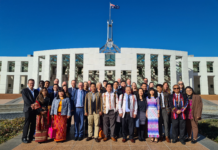
Partnerships are part of life. Society as a whole unconsciously and consciously enters into partnerships so that we can function. We work in conjunction with councils and businesses through to spouses and friends. We get things done with others and through others, each fulfilling the missing aspect in another.
In churches, we are in a deep and abiding partnership with other people of faith. Often church membership documents use the language of covenant to describe the relationship that exists between the members that make up the local expression of the church.
With this in mind, it seems only logical that the church would enter into partnership with agencies, both Christian and non-Christian, to fulfill it’s mission. However this is not always the case. I have been part of faith communities that would not partner with local councils or schools because of a view they held on certain topics. It was thought that we would, in some way, be spiritually polluted or the devil would have access to our ministry if we dared to partner with these groups.
I am not sure about you, but I serve a God who is a heck of a lot bigger than any spiritual enemy and has cleansed me beyond the pollution of this world. In fact, I believe he has called his people not to be infected by the world but to be a light into the darkest places. This ‘us verses them’ attitude toward the world, the ‘sacred verses the secular’, strips Jesus of his power and cripples ministry that could otherwise thrive.
Another church I was part of held the view that the church was about ‘Real Life Not Religion’. We believed that Romans 1:20 is true “For his invisible attributes, namely, his eternal power and divine nature, have been clearly perceived, ever since the creation of the world, in the things that have been made. So they are without excuse.” We believed that if this was true then the world outside the church was not the enemy, evil or to be feared; it gave voice to God’s attributes and provided opportunity to expand the Kingdom of God.
We partnered with the local council though it held vastly different views to ours, we joined with government agencies even though we disagreed with some of their policies and we worked with people in the community who did not know Jesus yet who helped us greatly in our ministry endeavours.
So how do we decide who to work with and who not to work with? Consider these two passages:
Luke 9:49-50: John answered, “Master, we saw someone casting out demons in your name, and we tried to stop him, because he does not follow with us.” But Jesus said to him, “Do not stop him, for the one who is not against you is for you.”
Luke 11:23: Whoever is not with me is against me, and whoever does not gather with me scatters.
At face value, it appears to say two completely different things, however when you look closer it gives us a measure as to whom we can collaborate with and whom we cannot. Both passages talk about the work of Christ and how people participate or do not participate in this work. Luke 9:50 shows us that the work of Christ can be and is done completely external to the church and the presence of God.
We see this in the various great works that secular charity organisations do in the community. Jesus is saying that as long as their work is the work of the Kingdom of God – heal the sick, care for the needy, and so on; they are unwittingly doing work of which Jesus would approve.
Luke 11:23 looks at it a different way. Jesus declares that those who do not work for the purposes of the Kingdom are the ones who work against him – ironically in this case the religious leaders.
Jesus points to the fact that any group or person who is doing the work of the kingdom is a potential partner for followers of Jesus – what a great opportunity to live out our fifth core value: Partnership Orientated – Recognising and celebrating God at work both within and beyond our movement. Evidenced by mutual respect, healthy dialogue, and where appropriate resource sharing and the development of common goals.
Practically, how does this look? I look for 3 aspects of partnership when considering joining with another organisation in ministry.
1. A Common Goal
Does the group have the same focus or goal through their activity that you do? If you are both working towards the same goal then a natural synergy exists. This may be raising funds for overseas aid, feeding the hungry in the community or providing pastoral care to the ageing population in the community. As an example, our church was paid by the local council to mentor at risk youth from the local high school.
2. A Mutual Benefit
Does the relationship benefit both groups in achieving this goal? Often a partnership will increase the reach and impact of any activity as you increase your resources. In the case of youth mentoring, the council saw a need to intervene before youth started anti-social behaviour and our church was able to offer support and guidance to hurting non-Christian youth.
3. A Mission Opportunity
Does an opportunity exist to share the gospel? This can either be through the actual activity, such as the youth in the previous example, or with the people you work alongside in the partnership. What better way to share faith with someone than to share your story as you pack hampers for the community or cook sausages at a fundraising BBQ.
Partnership can be a great way to expand your ministry and provides an opportunity to share faith alongside people whom you would normally never meet.
However, the orientation towards partnership extends beyond active involvement and extends to the recognition of Kingdom orientated ministry outside of your own, and conversation with these and other groups to help build relationships or enhance understanding. It through attempting to recognise what God is doing through others and leveraging from that activity growth in your local faith community.
Below are some simple examples of how you might engage with local organisations in partnership.
Councils – Most council will have a ‘Social Plan’ that will outline community needs and the vulnerable people within the area. They are always happy to have groups, even churches, assist them in impacting the community.
Support Groups – These can include ‘Anonymous’ (eg. Alcoholics Anonymous) groups and playgroups that already exist in many communities. How can your church community partner with these organisations either officially or as participants?
Other Churches – Are you praying and working with other churches in the community? The simple act of coffee between pastors, leaders and/or members can identify incredible community transforming ministry opportunities.
Schools – How can you support the work of your local school either through SRE or in other ways. My previous church would deliver over 400 hampers to schools who would then pass them onto school families in need.
Socially minded businesses and individuals – Many people who do not attend church want to get involved in local activities that impact the lives of people. Fundraising, volunteering and sponsorships can be done in conjunction with the community dramatically increasing the impact you can have.
Who could you impact in your community if you just had more people or more resources? The people and the resources are there you just need to look beyond your four walls to find them.



































